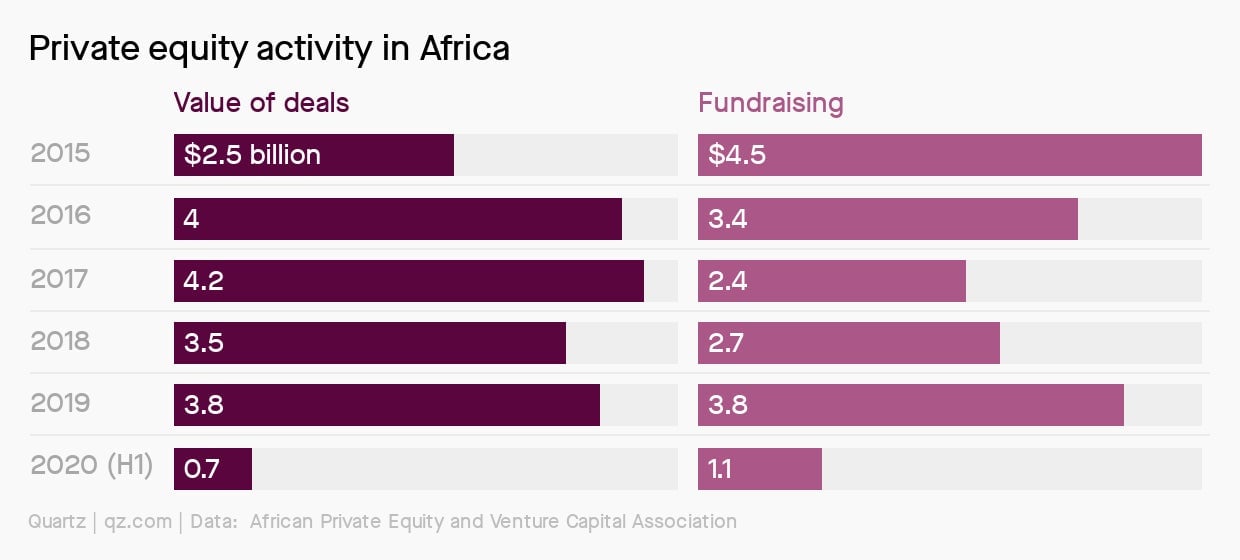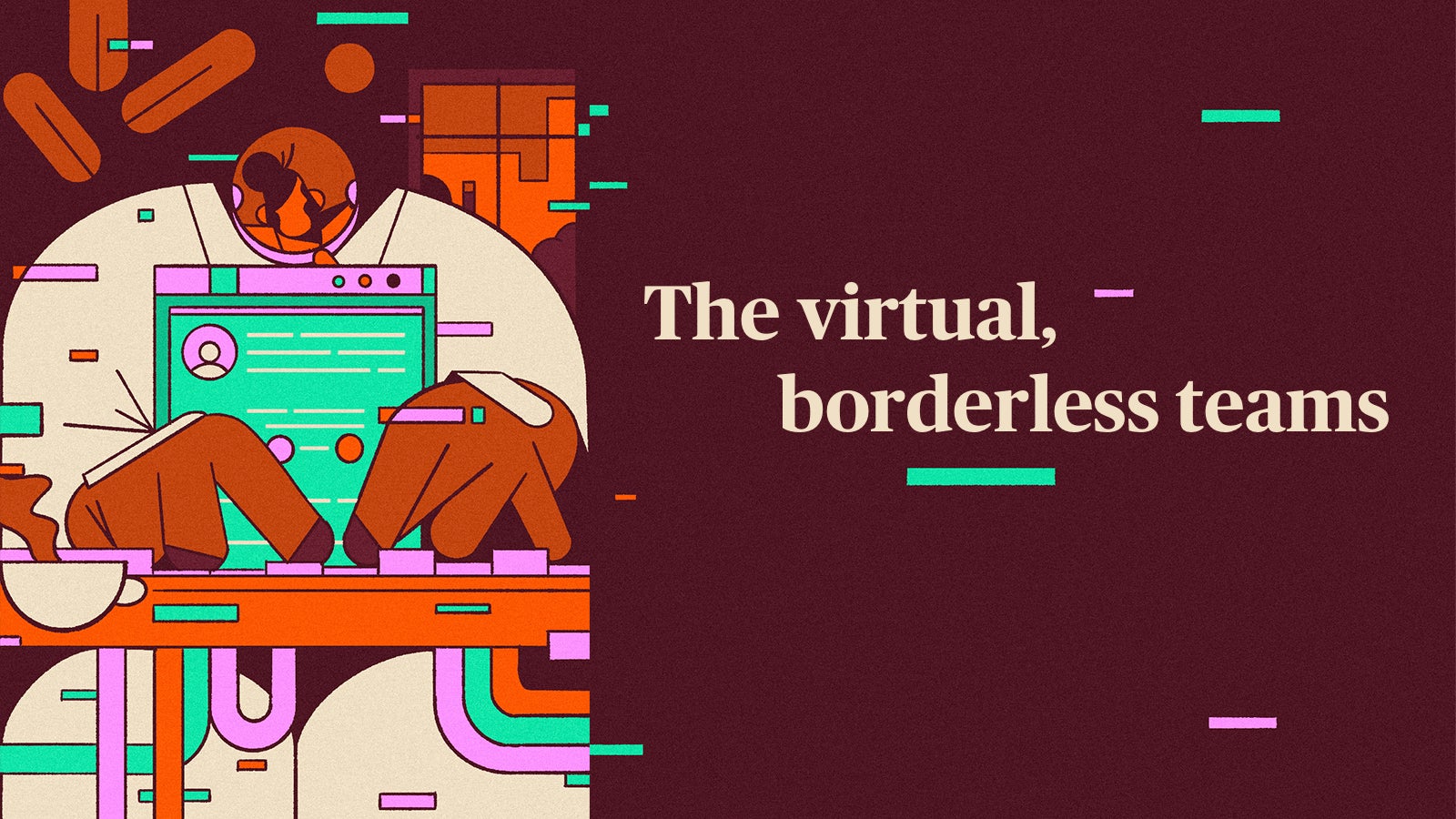Africa’s 5G dream, Nigeria’s vaccine, Cameroon’s uncertainty, private equity plunges
Hi, Quartz Africa readers!

Hi, Quartz Africa readers!
China’s influence
Last month things came to a head with Kenya’s $4.7 billion Special Gauge Railway. Just three years after launching with much fanfare and optimism the economic downturn prompted by the global pandemic has removed any last bit of cover it had.
The railway, the first part of which was built to help increase cargo throughput for the Port of Mombasa, had been losing money every month rather than generating profits which might have helped pay off the billions owed to the Chinese who helped build it. The railway has long been dogged by controversy in part because, even before the crisis, it was struggling to prove a commercially viable infrastructure investment.
A report by the Kenyan Parliament’s transport committee on Sept. 22 made the case for the government to renegotiate its loan terms with its Chinese lenders given the global economic circumstances. The report also recommended the government look to try and slash operational costs by “at least 50%”. The railway is operated by Africa Railway Star, a subsidiary of China China Road and Bridge Corporation (CRBC), which is said to receive a $10 million monthly management fee.
Kenya’s ongoing SGR troubles are just one of several China-Africa scenarios unravelling due to the extreme times we’re in right now.
In Angola, sub-Saharan Africa’s second largest oil producer, the stakes are high with debt of $20.1 billion to China, its largest bilateral creditor, after years of deals linked to its now beleaguered oil industry. With up to $2.7 billion due this year to China and more with other creditors, it was able to negotiate a $6 billion payment saving [Portuguese] through June 2023, via the G20.
Over in Zambia, the finance ministry has clashed with its eurobond holders after suggesting they delay $3 billion in due payment till April 2021. The bondholders have said no, and it is now being interpreted as Zambia becoming the first African country of the current period to default. Reports suggest a sticking point for the creditors was the fact the Zambia owes nearly $10 billion to China and that there has been little transparency as to whether they (bondholders) were being treated on an equal basis with the Chinese.
All of these negotiations are fluid and still developing, but we intend to shed more light and give you much more context in our upcoming virtual event on Oct. 8: What China’s influence in Africa means for the global economy.
We’ll have some of sharpest thinkers in China-Africa discussions including W. Gyude Moore, a senior fellow with the Center for Global Development and a former public works minister in Liberia; Hannah Ryder, chief executive of Beijing-based Development Reimagined; and Eric Olander, managing editor of China Africa Project, with whom we recently recorded a preview podcast.
Please join us and we’ll be welcoming your questions on one of the most important areas of focus for Africa and China watchers.
— Yinka Adegoke, Quartz Africa editor
Five stories this week
A new Trump admin proposal makes it more difficult for African students to study in the US. US authorities are attempting to rewrite student visa rules as part of the latest anti-immigration policy. Yet again, as Yomi Kazeem reports, if implemented Africa would bear the brunt with specific proposals disproportionately impacting African students.
Cameroon’s “president for life” is facing protests as the Anglophone crisis rumbles on. About a month before he marks his 38th year as president of Cameroon, Paul Biya is facing a new wave of local unrest. A former Biya ally turned opposition critic is leading fresh calls and protests for the president’s ouster despite the risk of clampdown by security forces, reports Amindeh Blaise Atabong.
How South Africa became one of the world’s most robust business outsourcing hubs. The strict lockdowns instituted by the South African government in the wake of the Covid-19 pandemic has come with a silver lining. As Brian Browdie writes, with local companies in Johannesburg and Cape Town quickly adapting, South Africa has emerged as a resilient business outsourcing hub.
Nigerian scientists developed a Covid-19 vaccine candidate but need funding for human trials. As the global race to develop a Covid-19 vaccine continues, there have been recurring questions over how involved Africa is in ongoing research. But as Uwagbale Edward-Ekpu explains, a homegrown Nigerian vaccine candidate which could yet ease those concerns but faces a major stumbling block.
The 5G “revolution” is underway in Africa—but it remains a long way off from reality. While the rest of the world races to make 5G networks become the standard, mass adoption is not yet on the cards in Africa. Latest projections show that despite ramped up investment by mobile operators, 5G connections will account for only 3% of the total mobile connections on the continent by 2025.
Dealmaker
Private equity deals in Africa are on pace for a massive drop this year. Private equity activity is slowing down across Africa in comparison to recent years in the wake of the Covid-19 pandemic. Based on numbers from the first half of the year, the value of private equity deals on the continent is on pace for a massive drop compared to last year but these sectors are doing well.

•MAXng, the Nigerian mobility startup, secured $1 million under its newly structured 10 billion naira ($22 million) private company bond program. The bond issuance was fully subscribed.
•Good Nature Agro, a Zambian agritech startup, secured $2.1 million in a Series A funding round from Goodwell Investments as well as seed investors Global Partnerships and FINCA Ventures.
•Easy Solar, a solar energy company with operations in West Africa, raised $3 million in a Series A funding led by impact investor Acumen and FMO, the Dutch development bank. It also raised $2 million in debt from Trine, an investment platform.
Quartz Gems:
Strengthening global teams
As Jackie Bischof writes, we are entering a golden age for global, borderless teams with colleagues in far-flung and, sometimes, unglamorous but efficient locations. The challenge is how to build trust between global teams.
One such example is Emily Nelson who has worked for more than 20 years on International Space Station operations. When on duty at Mission Control in Houston, Texas, Nelson is in constant contact with her peers in Munich, Tokyo, and Moscow.

Nelson explains that in space exploration, math is a common language, as are scientific principles. Read more in our latest field guide.
✦ Support our global team by becoming a Quartz member. You’ll get a paywall-free experience, plus member exclusives like our field guides, presentations, events, and more.
Other things we liked
In Senegal, even farmers want to live in Akon’s city of the future. Akon, the Senegalese-American rapper, has long championed an ambitious $6 billion project to build a city of the future just 100 kilometers south of Dakar, Senegal’s capital. But, as Le Monde’s Théa Olivier explains, it won’t be easy as there are many bureaucratic obstacles to the dream ever becoming reality. [French]
Remembering Funmilayo Ransome-Kuti: Nigeria’s ‘Lioness of Lisabi’. When Funmilayo Ransome-Kuti died at 76 in 1978, two Nigerian national newspapers ran with the headline: “Mama Fela is dead.” For Al Jazeera, Tayo Agunbiade recalls Ransome-Kuti as much more than the mother of a famous music star and her influence on the early feminist and democratic movements in Nigeria.
Ethiopia, Kenya and the Oromo quest. While cultural ties between the Oromo of Kenya and Ethiopia have long been recognized, Dalle Abraham argues in The Elephant both countries often delegitimize the Oromo Liberation Front’s struggles. “OLF ideologues and leadership view Kenya as an important player to whom they look with hope, believing peace will come sooner if Kenya steers the talks between the Oromo and Ethiopia.”
ICYMI
AlphaCode Incubate. An incubation program for South African fintech startups will see successful applicants share $600,000 in funding and a chance to apply for further early investment. (Oct. 26)
Yale Young Global Scholars Program. Applications are open for the two-week long academic program at Yale University for outstanding high school students from over 130 countries. (Nov. 10)
Iso Lomso Fellowships. A fully funded fellowship allowing African early-stage researchers develop and conduct long-term research. (Feb. 15, 2021)
Keep an eye on
What China’s influence in Africa means for the global economy (Oct. 8). Quartz Africa, in partnership with China Africa Project and Development Reimagined, will be hosting a live virtual event on Thursday, Oct. 8 at 9.30am ET/3.30pm Johannesburg/9.30pm Beijing. Register here.
*This brief was produced while listening to Gwindingew Rine Shumba by Thomas Mapfumo & the Blacks Unlimited (Zimbabwe). [Spotify]
Our best wishes for a productive and ideas-filled week ahead. Please send any news, comments, suggestions, ideas, South African outsourcing and 5G networks to [email protected]. You can follow us on Twitter at @qzafrica for updates throughout the day.
If you received this email from a friend or colleague, you can sign up here to receive the Quartz Africa Weekly Brief in your inbox every week. You can also follow Quartz Africa on Facebook.